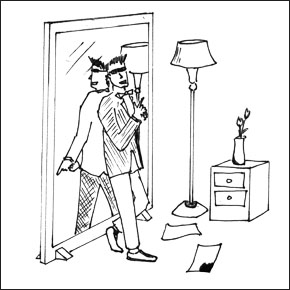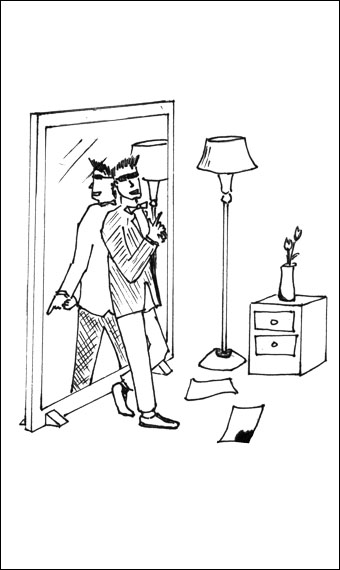

“One of our friends tried to pinch one of us to see if the other would feel the pain,” says senior Hillary Koh remembering a funny experience she and her fraternal twin sister and fellow senior Hanna Koh faced in their childhood.
Among critics of the phenomenon of twin telepathy, in which sets of twins supposedly communicate thoughts or feelings by means other than the known senses, are fraternal twins sophomores Daniella and Paige Kotowitz. Daniella Kotowitz says, “There’s no such thing as twin telepathy, at least for us.”
Fraternal twin juniors Amy and Brittany Pisoni have had a slightly different experience. “A lot of people don’t believe in twin telepathy, but for us it happens a lot. We finish each other’s sentences,” says Amy Pisoni. Brittany Pisoni says, “I know how [Amy] is going to react to something. It isn’t really telepathy; you just understand each other so well.”
Sophomores Rachel and Lauren Suarez are identical twins. Rachel Suarez says, “We finish each other’s sentences all the time and we say the exact same thing at the exact same time. We can also look at each other and I know what she’s thinking or how she feels in that moment.”
The Suarez twins share more than thoughts and feelings. Lauren Suarez says, “When we have switched classes before our Spanish teachers haven’t noticed.”
Rachel Suarez adds, “On twin day, earlier this year, we switched classes for the whole day. None of our teachers noticed or said anything.”
Twins, in addition to having a sibling with whom they can connect on a deep level, are the same age as their twin and, therefore, really understand what the other twin is going through.
Sophomores Malea and Mikeala Lamb-Hall are fraternal twins. Mikeala Lamb-Hall says, “You always have someone to talk to about problems that are maybe too personal to talk to with other friends.”
Malea Lamb-Hall agrees and says, “If a twin has an issue with parents, they’ll just understand more than friends because they actually know how parents are at home.”
Paige Kotowitz says, “If you go to an unfamiliar place and you don’t know anyone else there you already have someone to talk to.”
Hillary Koh says, “You can just walk across the hall [to get help with homework] instead of calling someone.”
Twins have these securities and strong friendships, but competition and comparisons are issues twins cope with.
Hanna Koh says, “When we get into different colleges we forget to be happy for each other. We get jealous.”
“I’d rather us get into the same places, but we try to be supportive,” says Hillary Koh.
Comparisons and competition can be fostered between the twins themselves. Hillary Koh says, “We do the comparison on our own. I compare my grades with Hanna. Sometimes I forget that it just matters how you do and not how other people are doing.”
Friends and family can also compare twins. Malea Lamb-Hall says, “I don’t like it when friends and family compare us. They list off all these ways we are different… It’s annoying, people treat you like you’re supposed to be the same person, but we’re not.”
In addition to comparisons, twins are also sometimes not treated as two separate individuals; some people expect twins to behave like one person. Daniella Kotowitz says, “We always tell people not to feel obligated to invite both of us to a social event.”
Although fraternal, Seniors Jamel and Paula Aranda sometimes get mixed up in the hallway by their teachers. Jamel Aranda says, “I hate it when people can’t tell us apart.”
Even though some teachers may not be able to differentiate between them in passing, talking to one of the twins should clear things up- Paula is pursuing a career in fashion, while Jamel is going into the army next year.
Fraternal twins, no matter how different their appearances may be, are still mixed up be others who know them.
Hillary Koh says, “One time I was in the offices at school and someone came up to me and started talking to me. I was really confused because I had never met this person before. Then I realized they thought I was Hanna,” who is significantly taller than Hillary, “so I pretended to be Hanna so it wouldn’t be awkward.”
Although, the ability to switch places with a twin has its advantages. Rachel Suarez says, “My first week of high school at Mercy I tripped over a backpack and I fell onto the floor. I was bright red… I don’t even know how, but chairs flew everywhere. Everyone thought it was Lauren though, that was really funny.”
Yet it seems the metaphorical scoreboard is even. “In middle school I switched with Rachel for a class so that I could talk to one of my good friends,” says Lauren, “I was talking so much that my teacher sent me out of the class thinking that I was Rachel. I got her into a little bit of trouble.”
Even with competition, confusion, and comparisons, twins tend to appreciate having a twin.
“I love being a twin,” says Rachel Suarez.
Amy Pisoni says, “It’s like having a built in best friend.”



